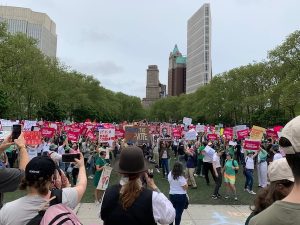Unpacking the Shirley Exception
With four books out this year that need social media attention, I’ve been spending way too much time on Twitter. Occasionally, though, there are thought-provoking threads about current issues. One of these has to do with what’s called the Shirley Exception. In recent cases, it’s had to do with draconian laws against abortion, ones that make pregnancy termination difficult or impossible to access, even when the health and life of the mother are in danger.
The Shirley Exception translates to: “But surely they would make an exception.” Because the pregnancy was planned and wanted, but a medical emergency arose (as it does in one of four pregnancies). Because the pregnant person is near death with a non-viable fetus. And because the one whose life is in danger happens to be a loyal Republican and staunchly pro-life.
For this 41-year-old woman in Missouri whose water broke at 17 weeks, there was no Shirley Exception. The desperate woman even contacted her Republican state senator, who she’d supported in the past, and he callously referred her to an anti-abortion crisis pregnancy center. After she pleaded her case further, he ghosted her. With her condition deteriorating and in great emotional anguish, she finally found a clinic in Illinois that could help her.
 Realizing there’s no Shirley Exception for their individual circumstance goes beyond disappointment. Having been betrayed by a system they trusted, they’re now trapped in an unanticipated and frightening situation. I try to capture that moment in a scene in Torch, when Tomáš, the son of a regional Communist Party leader in Czechoslovakia in 1969, returns from a Party meeting in which he is forced to denounce his best friend. There, he’s found out that his longtime bully — also a friend of his best friend — has been arrested in conjunction with a letter the three boys had written together to protest the Soviet occupation of their country and their subsequent loss of their freedoms.
Realizing there’s no Shirley Exception for their individual circumstance goes beyond disappointment. Having been betrayed by a system they trusted, they’re now trapped in an unanticipated and frightening situation. I try to capture that moment in a scene in Torch, when Tomáš, the son of a regional Communist Party leader in Czechoslovakia in 1969, returns from a Party meeting in which he is forced to denounce his best friend. There, he’s found out that his longtime bully — also a friend of his best friend — has been arrested in conjunction with a letter the three boys had written together to protest the Soviet occupation of their country and their subsequent loss of their freedoms.
Tomáš covered his twitchy eyelid. “But you’re friends with his father. You said you had a duty to Comrade Jelínek. Can’t you get the charges thrown out?”
His father reached toward him, but he shrank toward the door and his father drew back his hand. “Son, we’re a nation of laws, and the laws have to be followed in every case. No exceptions.”
The weight of his father’s words crushed all hope that his life could continue as before. As soon as Štěpán named him for the letter, they’d follow the law. Tomáš’s father would disappear from the meeting as Comrade Jelínek had. Lose his position with the Party, maybe even his regular job as the lawyer for the town. And if he didn’t kill Tomáš first, the interrogators or the other prisoners would.
Or else his father would ship him to a psychiatric hospital as soon as he turned eighteen. Claim he’d done everything he could, and maybe they’d let him keep his district leadership position out of pity for having an antisocial son who couldn’t be fixed.
In fact, however, exceptions do exist. Not for the Missouri woman, who the state senator considered expendable, or for Tomáš, whose father was basically a mid-level Party apparatchik whose privilege meant a large house, plenty of food, and the ability to buy foreign consumer goods unavailable to the average person — things that could be easily taken away if he or his family members stepped out of line.
In authoritarian and totalitarian states and oligarchies, a few people remain above the law. Restrictive laws don’t apply to political and economic elites, though even those may find themselves in danger when their fortune runs out. Consider Chinese businessmen behind bars for “corruption” (though corruption continues apace) or Russian oligarchs who mysteriously fall out of windows. But we see a Senate candidate in Georgia who supports a nationwide abortion ban while paying for (and even forcing) girlfriends’ abortions, and a Congressional representative from Tennessee who keeps getting reelected even though as a doctor he knocked up patients and paid to terminate their pregnancies.
“Freedom for me, but not for thee.” Many people who may think they’re in the in-group, entitled to Shirley Exceptions, find out they don’t qualify for that special status. Their loyalty turns out to be worth nothing. To the social betters who they worship, they don’t count.
As I was reading parts of this piece out loud and mentioned the name Shirley, the Siri on my watch said, “This name is not in your contacts.”
Update 10/31/22: The woman who had to go out of state for her lifesaving abortion later told her story in an ad for the Democratic candidate for Missouri governor. As a result, the state’s Attorney General (and Republican candidate for governor) sicced investigators from the Department of Health and Senior Services on the hospital that initially treated the woman, and she remains subject to investigation as well. More information here.






